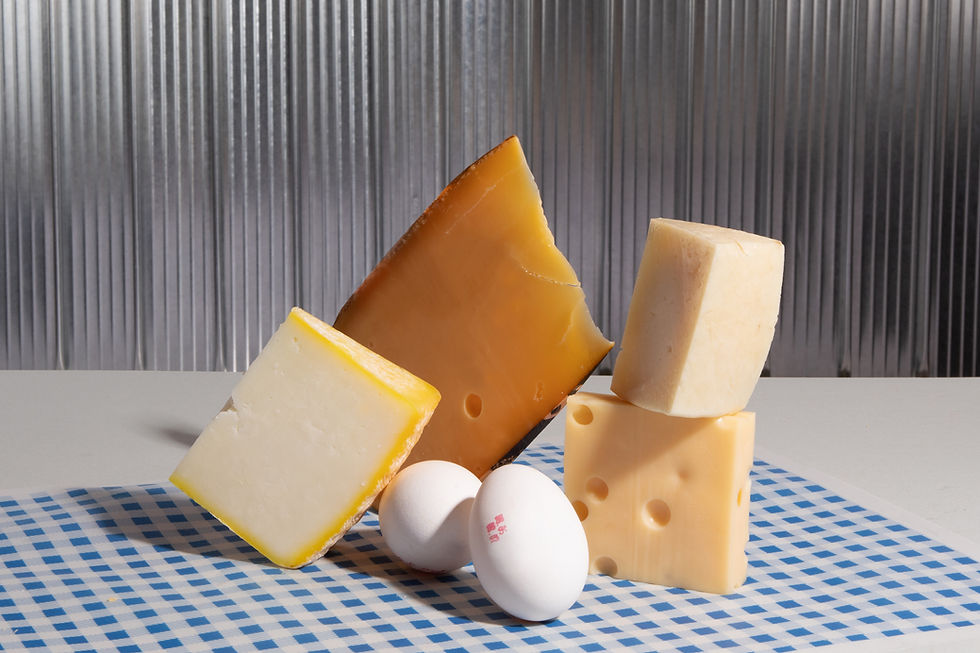FAT FACTS AND FAT FICTION
- Helen Kimber

- Apr 4, 2022
- 6 min read
There is so much miss information around in relation to fat – some of it is fact, some of it is fiction and some of it is totally confusing. In this article I hope to dispel some myths and give you valuable insight to a nutrient that is vital to life and often gets a very bad press!

In nutrition there are fats and oils. The liquid ones are called oils and the solid ones are called fats.
THEY ALL HAVE THE SAME AMOUNT OF ENERGY. So a bottle of olive oil will give you just as many calories as as a block of butter but won’t clog your arteries quite as much!

Fats are essential to life- as well as for maintaining a healthy weight. The low fat diet brigade have got it all wrong- read on to find out why.
We hear the term good fats and bad fats – again putting emotions onto foods and nutrients. Rather than linking fats as good or bad, try to look at the role they play in the amazing machine called your human body. Plus more importantly- if you are lacking this essential nutrient what are the potential health issues?
Some of the key functions of fat in your body
1) Energy- after carbohydrates,
2) Protection of the body organs and bones. Fat is essential as cushioning for the bones.

3) Making hormones- ALL hormones require lipids- so no fat means no hormones. No hormones- the end of life as we know it!
4) Brain development- the brain is 60% fat, therefore in rapid weight loss diets or with eating disorders such as anorexia nervosa, there is often mood swings and confusion. Brain fog, poor memory, lack of concentration, low mood. Fat also is essential to relay messages from the nerve cells to the brain.
5) Cell structure- every cell of the body is made up of fat in the cell wall. Therefore, low fat intake often presents with dry hair, dandruff, dry skin, People who eat insufficient good fats may present with keratinosis pilaris- which is sand paper like skin especially at the top of the arms which no amount of expensive exfoliators and skin creams will get rid of. If this is something that affects you, consider looking not only at the type of fat in your diet but also if you are absorbing it correctly. You may have to look at your gut health.

6) Immune health- The fat soluble vitamins ADE&K which are essential for many functions one of which is fighting infection need fats to help them be absorbed in the body.
Unravelling the confusion – hopefully!
We hear of saturated and polyunsaturated fats, cholesterol and trans fats
During digestion fats and oils are broken down into their constituent parts, fatty acids and glycerol.
The fatty acids are either Saturated OR Unsaturated
FATS WITH LOTS OF SATURATED FATTY ACIDS ARE CALLED SATURATED FATS AND FATS AND WITH LOTS OF UNSATURATED FATTY ACIDS ARE CALED POLYUNSATURATED. generally hard fats tend to be saturated and liquid fats tend to be unsaturated. But this is not always the case.
Saturated fats can be recognized by being solid at room temperature. Animal fats come into this category. Examples are
Butter, lard, fat in milk, fat in yogurt, cheeses- especially hard cheese, fat on meat, fat in cakes and pastry, pies, sausage rolls.

Saturated fats are often vilified as they are linked with cardiovascular disease and increased cholesterol. However, they are still essential IN MODERATION as they provide insulation and energy. However most people today eat far too much of this type of fat as their diets consist largely of fast foods, take away's, processed ready meals and convenience type foods.
If people ate a much more natural diet their intake of saturated fats would be much better balanced.
Then we hear about cholesterol. What is it?
Cholesterol is a type of fat manufactured by the body. It is linked with an increase of saturated fats. Cholesterol is ESSENTIAL as it is a precursor to many of our hormones. No cholesterol, no hormones!! Cholesterol is manufactured in the body and it has been shown that a diet low in fibre is less likely to have a good elimination process and so cholesterol will be less likely to be eliminated and so increase. Often diets high in convenience foods are also low in soluble fibres- a double edged sword!
So then raised cholesterol gets prescribes statins, This modern method of a pill for every ill is only treating the symptoms rather than the cause. It is not the place here to discuss the side effects of statins. However, before you get prescribed a drug that you will be on for the rest of your life, maybe take a look at how you may change your lifestyle and the food you eat to improve your overall wellbeing for the long term not just on a whim.

Unsaturated fats mainly from Vegetable sources and fish
These can be recognized by being liquid at room temperature
olive oil, rape, sunflower, hemp, nut oils, oily fish, seeds such as sesame, pumpkin
Research suggests that unsaturated fats do not clog arteries as do saturated fats
Essential fatty acids
When we eat foods containing fat the digestive process breaks the fats down into the fatty acids. To make up into new fatty acids our bodies can use. However there are two that the body can not make up and these HAVE to be taken in as food.
They are omega 3 and omega 6 essential fatty acids
Omega 3 essential fatty acids found in oily fish are particularly beneficial, they have been shown to help reduce blood clots, lower total cholesterol. They also play a major role in cognitive function. If you don't eat fish then seeds and nuts are a good source.

The omega 6 essential fatty acids are essential for healthy skin and have been shown to help support PMS pain.
However the western diet has well as being high in saturated fat has also been shown to have too many omega 6 fats and not enough omega 3 fats.
It is s important to get the balance right. So increasing your intake of foods in the omega 3 table may help improve your ratio.
Ideally 4:1 omega 3 to omega 6
The table below shows sources of the essential fatty acids.
Omega 3
Oily fish
Flax oil
walnuts
Free range hens eggs
ALL oils need to be COLD pressed
Omega 6
Sunflower seeds
Sunflower oil
Safflower oil
Pumpkin seeds
Sesame seeds
ALL oils need to be COLD pressed
A note about TRANS fats- these are the real villains.

Trans fats are NOT NATURAL, they are manufactured in the food industry and have chemicals added to them to make an oil into a solid. They are thought to be more detrimental to health. than natural saturated fats!
Examples of trans fats
Low fat spreads & spreads that pretend to be butter.
Ready meals, convenience foods, pies and pastries. Processed foods all contain trans fats. Why would a food manufacturer use the best cold pressed expensive oils to make a cheap meal? They don’t!
If you make one change after reading this article may it be the removal of low fat spreads and low fat foods from your diet which are full of chemicals and trans fats.
Replace with natural full fat unadulterated versions which give better taste and which your body is designed to digest.
How do you know if you are eating the right amount of the right fats for your body?
Ask yourself this simple question
Is my diet high in ready meals, processed foods, convenience foods take away meals, fast foods, chocolates crisps, cakes pies, pastries, pasties, pizzas .
Only you will know the answer
In ayurvedic nutrition natural fats and oils are essential for optimal health. The inner fire termed agni needs to be maintained and is like the hearth of the fire where the digestive process ”cooks” the food to become our cells and tissues. By choosing to eat natural fats and oils we can proactively keep the digestive fire burning. Low fat foods and highly processed and manufactured foods have no life force to help keep the digestive fire burning. That is often why people who constantly eat low fat everything find it difficult to lose weight and their skin and hair suffers.
Hopefully this article has dispelled some of the fat myths and confusion. If you would like to book a discovery call with me to find out how I can help you improve your wellbeing using functional nutrition and ayurvedic principles then click on the link
















コメント